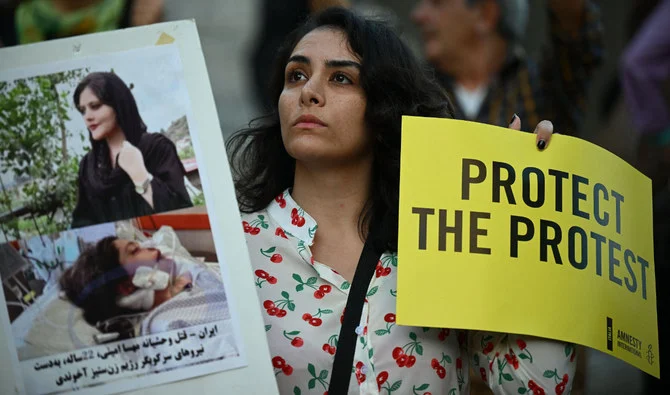
- ARAB NEWS
- 05 Jul 2025

While previous widespread protests in Iran consisted of the poor and middle class, the ongoing demonstrations following the death of Mahsa Amini appear to be mainly ushered in by the youth, particularly those known as Generation Z.
There exists a large gap between the ruling clerics and Gen Z when it comes to social, moral, ethical, religious and political values. As Sarah, a 22-year-old student in the capital, Tehran, summed up in an article for the Atlantic Council: “Throughout my life, I’ve learned that my country is different and its rules are difficult. I’ve also learned, while growing up, that I must not speak out about my rights; otherwise, I could be imprisoned, exiled, or even worse. Here, in my country, I could die for not approving of the Islamic Republic’s laws, which have oppressed my generation and generations before me.
She went on: “My teenage years felt so lonely because I was lost and confused. Just like many other families, I grew up in a nonconservative household. I had all the freedom a girl could want at home — whether it came to how I dressed, who my friends were, or when I could go out — but the outside world (was) very different. It felt like I was living two completely different lives. You see, anything in Iran can easily be a crime, including showing some hair.”
Iran has a large youth population, many of whom are disaffected and dissatisfied with the current political establishment. More than 60 percent of Iran’s 80-million population is under 30 years of age. The overwhelming majority of Gen Zers strive for a democratic system of governance, in which the freedoms of speech, press and assembly are not suppressed. However, they feel that they are left alone, more than ever before, in their attempts to achieve their aspiration of self-determination.
This should provide an opportunity for any state or nonstate actor that seeks to advance democracy in Iran. World powers or nonstate actors need to send a clear message that they stand with the young people of Iran and that they support their aspirations.
Siding with the majority of the Iranian people also means parting from having close political or diplomatic ties with the Iranian regime. A world power cannot send a contradictory message to the Iranian people by stating that it supports their cause, while at the same time its politicians sit at the same table as Iranian politicians, shaking hands and reaching business deals. The Iranian people would view such behavior as a double standard.
The problem is that, when Western governments show their friendship and support — politically, diplomatically, economically, geopolitically, strategically or in terms of trade — to the Iranian government, they are directly weakening the youth in Iran. Genuine support for the democratic cause favored by the overwhelming majority of the young people inevitably means standing firm against the Iranian regime.
In other words, the youth in Iran need assistance from outside to achieve their objectives. As Sarah, who is part of Iran’s Gen Z, pointed out: “This isn’t just my fight. This could easily be your story had you been born in my time and my country. To all the brave and beautiful people out there who know what freedom feels like, be our voice. Hold your authorities accountable for closing their eyes and ears to our cries for help. More importantly, hold the Islamic Republic accountable for the atrocities they are committing against the people of Iran. Better days lie ahead for us.”
The Iranian regime is continuously listed as the world’s leading sponsor of terrorism. Covert human rights and democratic groups inside Iran should be supported politically and financially. In addition, concentrating on the regime’s egregious record of human rights violations against the youth and women and Tehran’s total disregard for international laws can empower the young generation and put significant pressure on the Islamic Republic.
Finally, there are a large number of dissident groups inside and outside Iran that are connected and strive to help the younger generation. Unfortunately, without the political, diplomatic and financial support of other state and nonstate actors, these groups appear powerless in the face of Iran’s Islamic Revolutionary Guard Corps and the paramilitary Basij group.
In conclusion, the gap between the Iranian regime and Gen Z is too wide to bridge. Their values and priorities appear to be totally different. The youth in Iran are the biggest challenge to the ruling clerics’ hold on power.